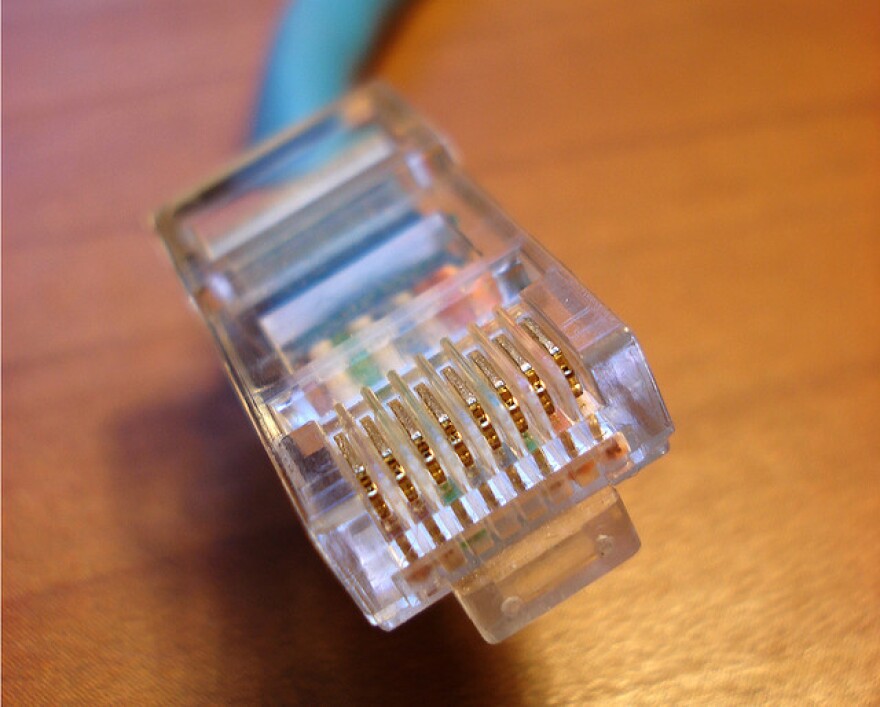Microsoft Corporation and a rural broadband company want to bring broadband internet access to more people living in remote parts of Wisconsin and Michigan’s Upper Peninsula.
Microsoft is collaborating with Packerland Broadband, based in Iron Mountain, Michigan, on an initiative to extend broadband internet service to more than 80,000 people mostly in northeast Wisconsin, but also across the Upper Peninsula.
Cory Heigl, Packerland Broadband’s vice president, says because of technological limitations it hasn’t been profitable for internet service providers to invest in broadband networks for sparsely populated areas, even though he says he hears from people living in those areas whom are desperate for connectivity.
“We get hundreds of those calls a week. And it’s always been sad, to be frank about it, that we cannot deliver broadband service to them economically,” Heigl said.
Heigl is also on the school board of Norway Vulcan Area Schools, in addition to his work with Packerland Broadband. Heigl says he happens to be able to get broadband service at his house, and sees how it benefits his children in school. Heigl says a significant number of students in the district can’t get high-speed internet at home.
“That hits me pretty hard, Heigl said. “I feel bad for the folks that just can’t provide that for their children. They’re having to stay later at school or go to a coffee shop or whatever to finish their schoolwork ... and that bothers me. Those kids should have a chance.”
Access to high-speed internet is a challenge in many rural areas of Michigan, and the United States. In a press release, Microsoft says more than 19 million Americans live without high-speed internet access. According to data from the Federal Communications Commission, more than half of the people living in rural areas of several Upper Peninsula counties don’t have any access to broadband. In Iron County (population 11,367), nearly 89% of people aren’t served by any broadband provider.
The project in Wisconsin and Michigan’s Upper Peninsula is part of a broader, more ambitious goal of Microsoft’s to “close the gap” in broadband coverage throughout the United States. To address the high costs and technological limitations of building broadband infrastructure in rural areas, Microsoft is turning to TV white spaces as a complementary medium – a relatively new way of transmitting broadband wirelessly, over longer distances. In a presentation last year, Microsoft President and Chief Legal Officer Brad Smith explained how Microsoft plans to use T.V. white spaces.
“This is unused spectrum in the UHF television bands. This powerful bandwidth is in the 600 MHz frequency range and enables wireless signals to travel over hills and through buildings and trees. It’s why people could watch television programs in rural communities long before the advent of satellite television.... One of the big benefits of this new approach is a dramatic reduction in the cost of bringing broadband rates to rural communities,” Smith said.
As of July 2017, Microsoft planned to have 12 “TV white spaces” pilot projects underway in 12 states over the next year. In Michigan and Wisconsin, Heigl says the TV white spaces technology will be used in conjunction with conventional broadband technology to expand coverage.
Most of Packerland Broadband’s clientele, if you haven’t guessed, resides in Wisconsin. But Heigl says roughly 15,000 people across Michigan’s Upper Peninsula could stand to get broadband coverage for the first time. He says Packerland Broadband will be working closely with Microsoft, with the hopes to start servicing the first new customers by mid-summer 2018.
“We’ve been testing the technology here for about four or five months,” Heigl said. “It’s pretty cool; nobody’s really adopted it yet. It is kind of the ‘chicken or the egg’ scenario. The manufacturers are not producing an economical version of this technology because nobody’s buying it, and nobody’s buying it because it’s uneconomical,” Heigl said. “We jumped in basically headfirst with Microsoft saying ‘we’re going to change that.’”






